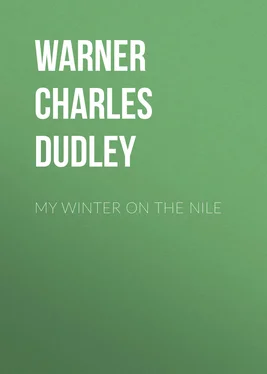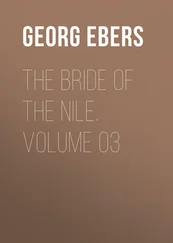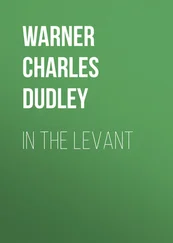Charles Warner - My Winter on the Nile
Здесь есть возможность читать онлайн «Charles Warner - My Winter on the Nile» — ознакомительный отрывок электронной книги совершенно бесплатно, а после прочтения отрывка купить полную версию. В некоторых случаях можно слушать аудио, скачать через торрент в формате fb2 и присутствует краткое содержание. Жанр: Путешествия и география, История, foreign_edu, foreign_antique, foreign_prose, на английском языке. Описание произведения, (предисловие) а так же отзывы посетителей доступны на портале библиотеки ЛибКат.
- Название:My Winter on the Nile
- Автор:
- Жанр:
- Год:неизвестен
- ISBN:нет данных
- Рейтинг книги:5 / 5. Голосов: 1
-
Избранное:Добавить в избранное
- Отзывы:
-
Ваша оценка:
- 100
- 1
- 2
- 3
- 4
- 5
My Winter on the Nile: краткое содержание, описание и аннотация
Предлагаем к чтению аннотацию, описание, краткое содержание или предисловие (зависит от того, что написал сам автор книги «My Winter on the Nile»). Если вы не нашли необходимую информацию о книге — напишите в комментариях, мы постараемся отыскать её.
My Winter on the Nile — читать онлайн ознакомительный отрывок
Ниже представлен текст книги, разбитый по страницам. Система сохранения места последней прочитанной страницы, позволяет с удобством читать онлайн бесплатно книгу «My Winter on the Nile», без необходимости каждый раз заново искать на чём Вы остановились. Поставьте закладку, и сможете в любой момент перейти на страницу, на которой закончили чтение.
Интервал:
Закладка:
The exercise is every moment growing more rapid, but in regular increments, as the music hastens—five minutes, ten minutes, fifteen minutes—until there is a very high pressure on, the revolutions of the cylinder are almost one in two seconds, and the piston moves quicker and quicker. The music, however, is not louder, only more intense, and now and then the reed-flute executes a little obligato, a plaintive strain, that steals into the frenzy like the note of a lost bird, sweet as love and sad as death. The performers are now going so rapidly that they can only ejaculate one syllable, ’.ah, ‘lah, ‘lah , which is aspirated in a hoarse voice every time the head is flung forward to the floor. The hands are now at liberty, and swing with the body, or are held palm to palm before the face. The negro cannot longer contain himself but breaks occasionally into a shrill “hoo!” He and two or three others have “the power,” and are not far from an epileptic fit.
There is a limit, however, to the endurance of the body; the swaying has become so rapid that it is difficult to distinguish faces, and it is impossible for the performers to repeat even a syllable of the name of Allah , all they can do is to push out from the depths of the lungs a vast hoarse aspiration of la-a-h , which becomes finally a gush exactly like the cut-off of a steam engine, short and quick.
The end has nearly come; in vain the cymbals clang, in vain the drum is beaten harder, and the horn calls to quicker work. The limit is reached, and while the reed expresses its plaintive fear, the speed slackens, the steam puffs are slower, and with an irregular hoo! from the colored brother, the circle stands still.
You expect to see them sink down exhausted. Not a bit of it. One or two having had enough of it, take their clothes and withdraw, and their places are filled by others and by some very sensible-looking men, trades-people evidently. After a short rest they go through the same or a similar performance, and so on for an hour and a half, the variations being mainly in the chanting. At the end, each derweesh affectionately embraces the Sheykh, kisses his hand without servility, resumes his garments and quietly withdraws. They seem to have enjoyed the exercise, and certainly they had plenty of it. I should like to know what they think of us, the infidel spectators, who go to look at their religious devotions as if they were a play.
That derweesh beggar in a green turban is by that token a shereef, or descendant of the Prophet. No one but a shereef is allowed to wear the green turban. The shereefs are in all ranks of society, many of them wretched paupers and in the most menial occupations; the title is inherited from either parent and the representatives of the race have become common. Some who are entitled to the green turban wear the white instead, and prefer to be called Sevd (master or lord) instead of Shereef. Such a man is Seyd Sadat, the most conspicous representative of the family of the Prophet in Cairo. His ancestors for a long period were the trustees of the funds of all the great mosques of Cairo, and consequently handled an enormous revenue and enjoyed great power. These millions of income from the property of the mosques the Khedive has diverted to his own purposes by the simple process of making himself their trustee. Thus the secular power interferes every few centuries, in all countries, with the accumulation of property in religious houses. The strict Moslems think with the devout Catholics, that it is an impious interference.
Seyd Sadat lives in the house that his family have occupied for over eight centuries! It is perhaps the best and richest specimen of Saracenic domestic architecture now standing in the East. This house, or collection of houses and disconnected rooms opening upon courts and gardens, is in some portions of it in utter decay; a part, whose elegant arches and marvelous carvings in stone, with elaborate hanging balconies and painted recesses, are still studies of beauty, is used as a stable. The inhabited rooms of the house are tiled two-thirds of the way to the lofty ceilings; the floors are of variegated marbles, and the ceilings are a mass of wood in the most intricate arabesque carving, and painted in colors as softly blended as the hues of an ancient camels’ hair shawl. In one of these gorgeous apartments, the furniture of which is not at all in keeping with the decorations (an incongruity which one sees constantly in the East—shabbiness and splendor are indissolubly married), we are received by the Descendant with all the ceremony of Eastern hospitality. Seated upon the divan raised above the fountain at one end of the apartment, we begin one of those encounters of compliments through an interpreter, out of which the traveler always comes beaten out of sight. The Seyd is a handsome intelligent man of thirty-five, sleek with good living and repose, and a master of Oriental courtesy. His attire is all of silk, the blue color predominating; his only ornament is a heavy gold chain about the neck. We frame long speeches to the Seyd, and he appears to reply with equal verboseness, but what he says or what is said to him we never know. The Eastern dragoman is not averse to talking, but he always interprets in a sort of short-hand that is fatal to conversation. I think the dragomans at such interviews usually translate you into what they think you ought to say, and give you such a reply as they think will be good for you.
“Say to his lordship that we thank him for the honor of being permitted to pay our respects to a person so distinguished.”
“His excellency (who has been talking two minutes) say you do him too much honor.”
“We were unwilling to leave Cairo without seeing the residence of so celebrated a family.”
“His excellency (who has now got fairly going) feels in deep the visit of strangers so distinguish.”
“It is a great pleasure also to us to see an Arab house so old and magnificent.”
“His excellency (who might have been reciting two chapters of the Koran in the interval) say not to mention it; him sorry it is not more worth you to see.”
The attendants bring sherbet in large and costly cups, and chibooks elegantly mounted, and the conversation flounders along. The ladies visit the harem above, and we look about the garden and are shown into room after room, decorated in endless variety and with a festivity of invention and harmony of color which the moderns have lost. The harem turns out to be, like all ordinary harems, I think, only mysterious on the outside. We withdraw with profuse thanks, frittered away through our dragoman, and “His excellency say he hope you have pleasant voyage and come safe to your family and your country.” About the outer court, and the door where we mount our donkeys, are many idlers in the sun, half beggars, half attendants, all of whom want backsheesh, besides the regular servants who expect a fee in proportion to the “distinguish” of the visitor. They are probably not unlike the clients of an ancient Roman house, or the retainers of a baronial lord of the middle ages.
If the visitor, however, really desires to see the antiquities of the Christian era, he will ride out to Old Cairo, and mouse about among the immense rubbish heaps that have been piled there since Fostat (as the ancient city was called) was reduced to ashes, more than seven hundred years ago, by a fire which raged nearly two months. There is the ruined mosque of Amer, and there are the quaint old Coptic convents and churches, built about with mud walls, and hidden away amid mounds of rubbish. To these dust-filled lanes and into these mouldering edifices the antiquarian will gladly go. These churches are the land of the flea and the home of the Copt. Anything dingier, darker, dirtier, doesn’t exist. To one of them, the Sitt Miriam, Church of Our Lady, we had the greatest difficulty in getting admission. It is up-stairs in one of the towers of the old Roman gateway of Babylon. It is a small church, but it has five aisles and some very rich wood-carving and stone-mosaics. It was cleaner than the others because it was torn to pieces in the process of renovation. In these churches are hung ostrich eggs, as in the mosques, and in many of them are colored marbles, and exquisite mosaics of marble, mother-of-pearl, and glass. Aboo Sirgeh, the one most visited, has a subterranean chapel which is the seat of an historical transaction that may interest some minds. There are two niches in the wall, and in one of them, at the time of the Flight into Egypt, the Virgin Mary rested with the Child, and in the other St. Joseph reposed. That is all.
Читать дальшеИнтервал:
Закладка:
Похожие книги на «My Winter on the Nile»
Представляем Вашему вниманию похожие книги на «My Winter on the Nile» списком для выбора. Мы отобрали схожую по названию и смыслу литературу в надежде предоставить читателям больше вариантов отыскать новые, интересные, ещё непрочитанные произведения.
Обсуждение, отзывы о книге «My Winter on the Nile» и просто собственные мнения читателей. Оставьте ваши комментарии, напишите, что Вы думаете о произведении, его смысле или главных героях. Укажите что конкретно понравилось, а что нет, и почему Вы так считаете.












